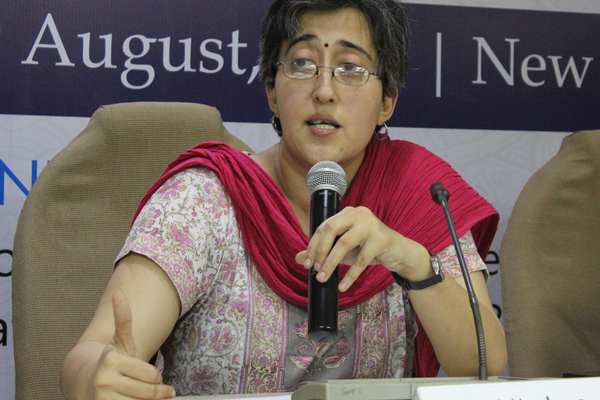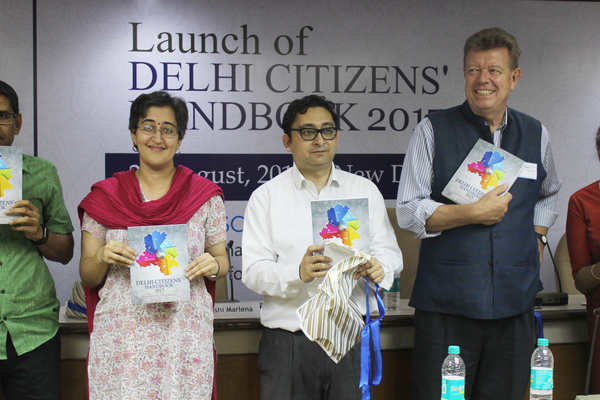New Delhi: Centre for Civil Society (CCS), on Tuesday, 29 August, hosted the launch event for its latest publication, the Delhi Citizens’ Handbook 2017, at National Cooperative Union of India. The programme involved the launch of the Handbook by Atishi Marlena, Advisor to the Deputy Chief Minister of Delhi, Manish Sisodia, accompanied by a panel discussion featuring distinguished personalities Anjali Srivastava (Praja), Vikramjit Banerjee (Advocate, Supreme Court) and Prof. Indira Rajaraman (IIM Bangalore) on the theme ‘Good Governance and Development: Performance and Strategic Reforms’.

The Delhi Citizens’ Handbook 2017 is a compilation of research papers on issues of public policy, prepared by interns who participated in the six-week ‘Researching Reality Internship’ (June-July 2017) conducted by CCS. The papers in the Handbook assess the impact and relevance of policies that shape the lives of ordinary citizens in the national capital on eight core areas of urban governance – Administration, Education, Public Healthcare, Water and Sewage, Labour and Employment, Food and Civil Supplies, Public Transport and Women’s Safety, and Housing Infrastructure.
The panel discussion at the launch event explored the idea of governance and development, taking from the policy shortcomings addressed in the Handbook. It also approached critical questions of how governance and developmental reforms, for instance the recent e-governance initiative, can take place in a country like ours, and what the expected role of governmental and non-governmental institutions will be in this process. President of CCS, Dr Parth J Shah, opened the event, stating that it is “politics of knowledge” as opposed to “politics of the street’’ that has been primarily taken up by the authors of the Handbook. It is essential to create and disseminate knowledge for citizens regarding services that they are entitled to, and that has been the aim of the Handbook. Panelist Anjali Srivastava also appreciated the efforts of the researchers, commenting that the Handbook specifically locates and examines the point at which the citizen interacts with the political system – the grievance redressal mechanisms – which are largely dysfunctional at present. Atishi Marlena furthered this idea and said that the crucial task for policymakers is to examine policies from the perspective of the recipients; it is not correct to say that a policy has good intentions but bad implementation, a policy that fails in implementation is a bad policy to begin with. The Delhi Citizens’ Handbook 2017 is a step forward in bringing to fore the voice of the primary beneficiaries of policy.

A number of key governance issues are raised in the Handbook. It is noted, for instance, that as far as administration is concerned, although the e-District Project is an important step forward in keeping with the Digital India campaign, the responsible body – the Directorate of Information and Publicity – has not yet taken any steps to promote the Project among citizens. Atishi Marlena also addressed this, stating that awareness campaigns are a key gap that must be addressed if the e-District Project is to succeed. Addressing the issue of social inclusion under the Right to Education Act, 2009, the authors find that segregation in classrooms is significantly prevalent among elite private schools. The leakages in the Public Distribution System and the efficacy of the Direct Benefit Transfer scheme for supplying food and civil supplies are also examined, noting errors of inclusion, where many beneficiary households are availing of PDS services despite earning more than Rs. 1 lakh per year. The Handbook further notes that the narrow definition of affordable housing at the state and national planning levels fall short of addressing the needs of the economically weaker sections of society, leading to allotted housing flats being sold off or rented out by the original allottees.
The Handbook thus functions as a critical resource for productive public intervention and has been prepared with the aim of ensuring an informed discussion on achieving effective and accountable governance.
About Centre for Civil Society: Centre for Civil Society advances social change through public policy. Our work in education, livelihood, and policy training promotes choice and accountability across private and public sectors. To translate policy into practice, we engage with policy and opinion leaders through research, pilot projects and advocacy. We are India’s leading liberal think tank, ranked 50 worldwide by the annual study conducted by the Think Tanks and Civil Society Program at the University of Pennsylvania
